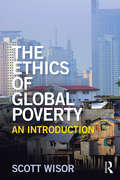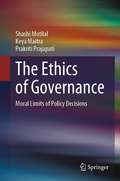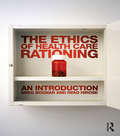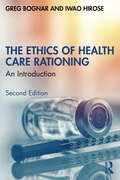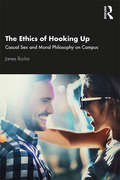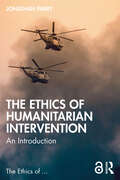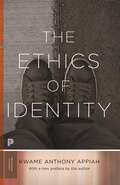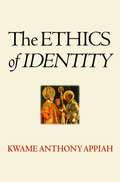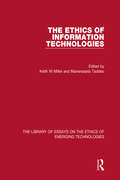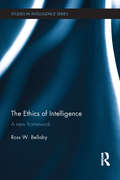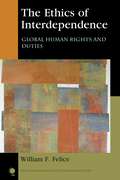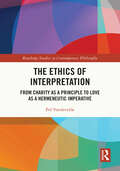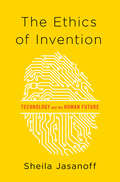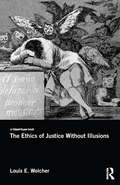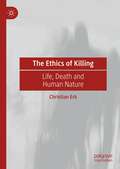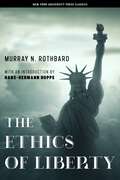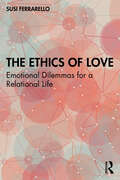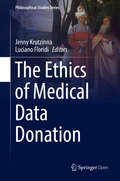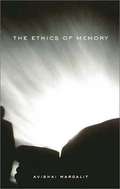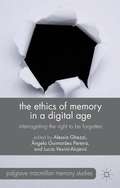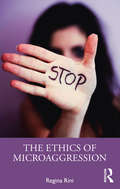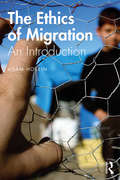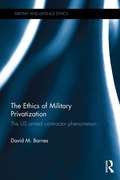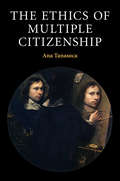- Table View
- List View
The Ethics of Global Poverty: An introduction (The Ethics of ...)
by Scott WisorThe Ethics of Global Poverty offers a thorough introduction to the ethical issues surrounding global poverty. It addresses important questions such as: What is poverty and how is it measured? What are the causes of poverty? Do wealthy individuals have a moral duty to reduce global poverty? Should aid go to those who are most in need, or to those who are easiest to help? Is it morally wrong to buy from sweatshops? Is it morally good to provide micro-finance? Featuring case studies throughout, this textbook is essential reading for students studying global ethics or global poverty who want an understanding of the moral issues that arise from vast inequalities of wealth and power in a highly interconnected world.
The Ethics of Governance: Moral Limits of Policy Decisions
by Keya Maitra Shashi Motilal Prakriti PrajapatiThe Ethics of Governance: Moral Limits of Policy Decisions offers a toolbox drawn from normative ethics which finds applications in public governance, primarily focusing on policy making and executive action. It includes ethical concepts and principles culled from different philosophical traditions, ranging from more familiar Western theories to non-Western ethical perspectives, thereby providing a truly global, decolonized and expanded normative lens on issues of governance. The book takes a unique and original approach; it demonstrates the use of the ethical toolbox in the context of actual examples of governance challenges.Taking three major case studies each representing an aspect of human-human and/or human-nature and/or human-animal relationship, the book attempts to show the significance of public practical reasoning in policy decisions with the aim of arriving at reasonable responses. Acknowledging the challenges that policy makers often face, the book highlights the fact that policy making is hardly an exercise yielding a black-or-white solution; rather it involves finding the most reasonable normative outcome (course of action) in a given situation, especially employing an expanded understanding of values including well-being, sustainability, interdependence and community. This effort that helps bridge the gap between ethical theorists and policy practitioners exemplifies the necessary role of ‘engaged philosophy’ in public governance.In the major case studies, Boxes offer facts and figures along with pertinent ethical questions that have been raised and discussed. Aiming to aid the engagement of a diverse audience including non-philosophy readers, each chapter also includes Boxes containing examples, shorter case studies, at-a-glance charts, and tables with comprehensive ethical tools for a quick recap.
The Ethics of Health Care Rationing: An Introduction
by Greg Bognar Iwao HiroseShould organ transplants be given to patients who have waited the longest, or need it most urgently, or those whose survival prospects are the best? The rationing of health care is universal and inevitable, taking place in poor and affluent countries, in publicly funded and private health care systems. Someone must budget for as well as dispense health care whilst aging populations severely stretch the availability of resources. The Ethics of Health Care Rationing is a clear and much-needed introduction to this increasingly important topic, considering and assessing the major ethical problems and dilemmas about the allocation, scarcity and rationing of health care. Beginning with a helpful overview of why rationing is an ethical problem, the authors examine the following key topics: What is the value of health? How can it be measured? What does it mean that a treatment is "good value for money"? What sort of distributive principles - utilitarian, egalitarian or prioritarian - should we rely on when thinking about health care rationing? Does rationing health care unfairly discriminate against the elderly and people with disabilities? Should patients be held responsible for their health? Why does the debate on responsibility for health lead to issues about socioeconomic status and social inequality? Throughout the book, examples from the US, UK and other countries are used to illustrate the ethical issues at stake. Additional features such as chapter summaries, annotated further reading and discussion questions make this an ideal starting point for students new to the subject, not only in philosophy but also in closely related fields such as politics, health economics, public health, medicine, nursing and social work.
The Ethics of Health Care Rationing: An Introduction
by Greg Bognar Iwao HiroseThe rationing of health care is universal and inevitable, taking place in both poor and affluent countries, in publicly funded and private health care systems. Someone must budget for as well as dispense health care whilst aging populations severely stretch the availability of resources. The Ethics of Health Care Rationing is a clear, timely, and much-needed introduction to this important topic. Substantially revised and updated, this second edition includes new chapters on disability discrimination and age discrimination, and on the price of drugs and medical therapies. Beginning with a helpful overview of why rationing is an ethical problem, the authors examine the following key topics: What sort of distributive principles should we rely on when thinking about health care rationing? What is the relation between ethics and cost-effectiveness in health care? How should we think about controversies surrounding discrimination over disability and age? How should we approach controversies surrounding rationing and the price of pharmaceutical drugs and medical therapies? Should patients be held responsible for their health? Why does the debate on responsibility for health lead to issues about socioeconomic status and social inequality? Throughout the book, examples from the United States, the United Kingdom, and other countries are used to illustrate the ethical issues at stake. Additional features such as chapter summaries, annotated further reading and discussion questions have also been updated, making this an ideal starting point for students new to the subject, not only in philosophy but also in closely related fields such as politics, health economics, public health, medicine, nursing and social work.
The Ethics of Hooking Up: Casual Sex and Moral Philosophy on Campus
by James RochaThe Ethics of Hooking Up: Casual Sex and Moral Philosophy on Campus provides a systematic moral analysis of hooking up, or sexual activity between people who barely know each other, frequently while intoxicated, and with little or no verbal interaction. It explores the moral quandaries resulting from this potent combination of sex, alcohol, near-anonymity, and limited communication, focusing in particular on issues involving consent and respect. After delineating common practices involving casual sex on college campuses and exploring the difficulty of reaching mutual consent, author James Rocha argues that respect, kindness, sensitivity, and honest communication are also necessary conditions for morally permissible casual sex. Key Features Provides a rare, systematic examination of the ethics of the hook up practice, which is the dominant mating practice for young people today. Analyzes the moral concepts of consent and respect in the context of hooking up, which provides significant moral challenges that highlight how we should obtain consent and show respect to one another. Argues for a moral paradigm shift in how young people hook up, emphasizing ways to avoid unintentionally committing grave moral wrongs. Situates the philosophy of casual sex in real life hook up practice, enabling us to rethink overly abstracted moral views on casual sex.
The Ethics of Humanitarian Intervention: An Introduction (The Ethics of ...)
by Jonathan ParryFew topics generate as much controversy and debate as armed humanitarian intervention. Military force involves death and destruction, as well as interfering in other countries’ domestic affairs. But, crucially, non-intervention is also controversial. When confronted with humanitarian crises abroad, many feel that outsiders are not only justified in using force to halt the abuses, but that they must do so. The Ethics of Humanitarian Intervention: An Introduction offers a guide to these ethical debates.In clear and informative style Jonathan Parry explores the following topics: The morality of defending others, including the ‘responsibility to protect’ (R2P). State sovereignty and self-determination as barriers to intervention. The possibility of consensual intervention. Just causes for intervention: what kinds of human rights abuses warrant intervention? The effectiveness of intervention: does it work in practice? Alternatives to intervention, including aiding rebels, economic sanctions, and providing aid. Whether there is a duty to intervene. Examples of intervention – including the former Yugoslavia, Iraq, Liberia, and Libya – are used to illustrate the ethical dilemmas in question. The arguments of important theorists of intervention, such as John Stuart Mill, Michael Walzer and Jeff McMahan, are also explained clearly and critically. Each chapter concludes with questions for discussion and reflection. The Ethics of Humanitarian Intervention: An Introduction is ideal reading for students and researchers in philosophy, applied ethics, politics and international relations.Chapter 3 of this book is freely available as a downloadable Open Access PDF at http://www.taylorfrancis.com under a Creative Commons Attribution (CC-BY) 4.0 license.
The Ethics of Identity (Princeton Classics #132)
by Kwame Anthony AppiahA bold vision of liberal humanism for navigating today’s complex world of growing identity politics and rising nationalismCollective identities such as race, nationality, religion, gender, and sexuality clamor for recognition and respect, sometimes at the expense of other things we value. To what extent do they constrain our freedom, and to what extent do they enable our individuality? Is diversity of value in itself? Has the rhetoric of human rights been overstretched? Kwame Anthony Appiah draws on thinkers through the ages and across the globe to explore such questions, developing an account of ethics that connects moral obligations with collective allegiances and that takes aim at clichés and received ideas about identity. This classic book takes seriously both the claims of individuality—the task of making a life—and the claims of identity, these large and often abstract social categories through which we define ourselves.
The Ethics of Identity (Princeton Classics Ser. #132)
by Kwame Anthony AppiahRace, ethnicity, nationality, religion, gender, sexuality: in the past couple of decades, a great deal of attention has been paid to such collective identities. They clamor for recognition and respect, sometimes at the expense of other things we value. But to what extent do "identities" constrain our freedom, our ability to make an individual life, and to what extent do they enable our individuality? In this beautifully written work, renowned philosopher and African Studies scholar Kwame Anthony Appiah draws on thinkers through the ages and across the globe to explore such questions.The Ethics of Identity takes seriously both the claims of individuality—the task of making a life—and the claims of identity, these large and often abstract social categories through which we define ourselves.What sort of life one should lead is a subject that has preoccupied moral and political thinkers from Aristotle to Mill. Here, Appiah develops an account of ethics, in just this venerable sense—but an account that connects moral obligations with collective allegiances, our individuality with our identities. As he observes, the question who we are has always been linked to the question what we are.Adopting a broadly interdisciplinary perspective, Appiah takes aim at the clichés and received ideas amid which talk of identity so often founders. Is "culture" a good? For that matter, does the concept of culture really explain anything? Is diversity of value in itself? Are moral obligations the only kind there are? Has the rhetoric of "human rights" been overstretched? In the end, Appiah's arguments make it harder to think of the world as divided between the West and the Rest; between locals and cosmopolitans; between Us and Them. The result is a new vision of liberal humanism—one that can accommodate the vagaries and variety that make us human.
The Ethics of Information Technologies (The\library Of Essays On The Ethics Of Emerging Technologies Ser.)
by Keith MillerThis volume collects key influential papers that have animated the debate about information computer ethics over the past three decades, covering issues such as privacy, online trust, anonymity, values sensitive design, machine ethics, professional conduct and moral responsibility of software developers. These previously published articles have set the tone of the discussion and bringing them together here in one volume provides lecturers and students with a one-stop resource with which to navigate the debate.
The Ethics of Insurgency
by Michael L. GrossAs insurgencies rage, a burning question remains: how should insurgents fight technologically superior state armies? Commentators rarely ask this question because the catchphrase 'we fight by the rules, but they don't' is nearly axiomatic. But truly, are all forms of guerrilla warfare equally reprehensible? Can we think cogently about just guerrilla warfare? May guerrilla tactics such as laying improvised explosive devices (IEDs), assassinating informers, using human shields, seizing prisoners of war, conducting cyber strikes against civilians, manipulating the media, looting resources, or using nonviolence to provoke violence prove acceptable under the changing norms of contemporary warfare? The short answer is 'yes', but modern guerrilla warfare requires a great deal of qualification, explanation, and argumentation before it joins the repertoire of acceptable military behavior. Not all insurgents fight justly, but guerrilla tactics and strategies are also not always the heinous practices that state powers often portray them to be.
The Ethics of Intelligence: A new framework (Studies in Intelligence)
by Ross W. BellabyThis book starts from the proposition that the field of intelligence lacks any systematic ethical review, and then develops a framework based on the notion of harm and the establishment of Just Intelligence Principles. As the professional practice of intelligence collection adapts to the changing environment of the twenty-first century, many academic experts and intelligence professionals have called for a coherent ethical framework that outlines exactly when, by what means and to what ends intelligence is justified. Recent controversies, including reports of abuse at Guantanamo Bay and Abu Ghraib, allegations of extraordinary rendition programmes and the ever-increasing pervasiveness of the ‘surveillance state’, have all raised concerns regarding the role of intelligence in society. As a result, there is increased debate regarding the question of whether or not intelligence collection can be carried out ethically. The Ethics of Intelligence tackles this question by creating an ethical framework specifically designed for intelligence that is capable of outlining under what circumstances, if any, different intelligence collection activities are ethically permissible. The book examines three of the main collection disciplines in the field of intelligence studies: imagery intelligence, signals intelligence and human intelligence. By applying the ethical framework established at the beginning of the book to these three important intelligence collection disciplines, it is possible to better understand the ethical framework while also demonstrating its real-life applicability. This book will be of much interest to students of intelligence studies, ethics, war and conflict studies, security studies and IR.
The Ethics of Interdependence: Global Human Rights and Duties
by William FeliceIn this powerful book, William F. Felice argues that a new range of human rights duties for individuals, nation states, and global institutions has emerged in our modern interconnected era. He investigates the compelling ideas of ethical interdependence and new global human rights duties in four case studies: mass incarceration in the United States, LGBT rights in Africa, women’s rights in Saudi Arabia, and environmental rights in China. Felice argues that in all four cases a “human-rights threshold” has been surpassed, and urgent action is needed to address unacceptable levels of human suffering. <p><p> Beginning with a primer on how the international community through the United Nations has codified international human rights law, Felice explores the conflicts between rights, problems of compliance, and the difficulties that emerge when cultural and religious rights are privileged over the rights of individuals and groups. He shows that a robust normative framework of global governance and global citizenship is central to the actualization of human rights protection for all.
The Ethics of Interpretation: From Charity as a Principle to Love as a Hermeneutic Imperative (Routledge Studies in Contemporary Philosophy)
by Pol VandeveldeThis book discusses the ethical dimension of the interpretation of texts and events. Its purpose is not to address the neutrality or ideological biases of interpreters, but rather to discuss the underlying issue of the intervention of interpreters into the process of interpretation. The author calls this intervention the "ethical" aspect of interpretation and argues that interpreters are neither neutral nor necessarily activists. He examines three models of interpretation, all of which recognize the role that interpreters play in the process of interpretation. In these models, the question of the truth or validity of interpretation is dependent upon the attitude of interpreters. These three models are: (1) the principle of charity in interpretation in the two different versions defended by Hans-Georg Gadamer and Donald Davidson; (2) the production of truth, as developed by Paul Ricoeur and Michel Foucault; and (3) the regulative principle in interpretation as formal validity claims—as presented by Karl-Otto Apel and Jürgen Habermas—and as benevolence or love as an epistemic virtue—as defended by Friedrich Schlegel and Friedrich Schleiermacher. The critical discussion of these three models, which brings to the fore the different manners in which interpreters intervene in the process of interpretation as persons, lays the foundations for an ethics of interpretation. The Ethics of Interpretation will be of interest to scholars and advanced students working in hermeneutics, 19th- and 20th-century philosophy, literary theory, and cultural theory.
The Ethics of Invention: Technology and the Human Future
by Sheila JasanoffWe live in a world increasingly governed by technology--but to what end? Technology rules us as much as laws do. It shapes the legal, social, and ethical environments in which we act. Every time we cross a street, drive a car, or go to the doctor, we submit to the silent power of technology. Yet, much of the time, the influence of technology on our lives goes unchallenged by citizens and our elected representatives. In The Ethics of Invention, renowned scholar Sheila Jasanoff dissects the ways in which we delegate power to technological systems and asks how we might regain control. Our embrace of novel technological pathways, Jasanoff shows, leads to a complex interplay among technology, ethics, and human rights. Inventions like pesticides or GMOs can reduce hunger but can also cause unexpected harm to people and the environment. Often, as in the case of CFCs creating a hole in the ozone layer, it takes decades before we even realize that any damage has been done. Advances in biotechnology, from GMOs to gene editing, have given us tools to tinker with life itself, leading some to worry that human dignity and even human nature are under threat. But despite many reasons for caution, we continue to march heedlessly into ethically troubled waters. As Jasanoff ranges across these and other themes, she challenges the common assumption that technology is an apolitical and amoral force. Technology, she masterfully demonstrates, can warp the meaning of democracy and citizenship unless we carefully consider how to direct its power rather than let ourselves be shaped by it. The Ethics of Invention makes a bold argument for a future in which societies work together--in open, democratic dialogue--to debate not only the perils but even more the promises of technology.
The Ethics of Justice Without Illusions
by Louis E. WolcherThe founding premise of this book is that the nimbus of prestige, which once surrounded the idea of justice, has now been dimmed to such a degree that it is no longer sufficient to secure the possibility of a good conscience for those who undertake, in good faith, to make the world a better place in the spheres of politics and law. The many decent human beings who have noticed and experienced this diminishment of justice’s prestige find themselves in a thoroughly disenchanted existential situation. For them, the attempt to do justice without the illusion of being grounded in something beyond the sheer facticity of their own performances is a distinctly ethical theme, which cries out to be investigated in its own right. Heeding the cry, this book asks and attempts to answer the following fundamental ethical question: is a life in the law – even one spent in the pursuit of justice – worth living, and if so, how can a disenchanted person come to bear the living of it without constantly having to engage in self-deception? If Nietzsche is right that living without illusions is impossible for human beings, then the most important ethical implication of this essentially anthropological fact goes far beyond the question of what illusions we ought to choose. It must also include the question of whether we should succumb to that most seductive and pernicious of all illusions: namely, the belief that exercising great care and responsibility in choosing our illusions – which we might then call our ‘principles of justice’ – excuses us ethically for what we do to others in their name. The culmination of a 10 year legal-philosophical project, this book will appeal to graduate students, scholars and curious non-academic intellectuals interested in continental philosophy, critical legal theory, postmodern theology, the philosophy of human rights and the study of individual ethics in the context of law.
The Ethics of Killing: Life, Death and Human Nature
by Christian ErkIn this book, Christian Erk examines the ethical (im)permissibility of killing human beings in general and of selected killings in particular, namely suicide, lethal selfdefence, abortion and euthanasia, as well as organ transplantation and assisted suicide. He does so by addressing a range of important ethical questions: What does it mean to act? Of what elements is an action comprised? What is the difference between a good or evil action and a permissible or impermissible action? How can we determine whether an action is good or evil? Is there a moral duty not to kill? Is this duty held by and against all human beings or only persons? What and who is a person? What is human dignity and who has it? What is it that is actually taken when somebody is killed, i.e. what is life? And closely related to that: What and when is death? By integrating the answers to these questions into an argumentative architecture, the book offers a comprehensive exploration of one of the most fundamental questions of mankind: Under which conditions, if any, is killing human beings ethically permissible?
The Ethics of Liberty
by Murray N. RothbardThe authoritative text on the libertarian political positionIn recent years, libertarian impulses have increasingly influenced national and economic debates, from welfare reform to efforts to curtail affirmative action. Murray N. Rothbard's classic The Ethics of Liberty stands as one of the most rigorous and philosophically sophisticated expositions of the libertarian political position.Rothbard’s unique argument roots the case for freedom in the concept of natural rights and applies it to a host of practical problems. And while his conclusions are radical—that a social order that strictly adheres to the rights of private property must exclude the institutionalized violence inherent in the state—Rothbard’s applications of libertarian principles prove surprisingly practical for a host of social dilemmas, solutions to which have eluded alternative traditions.The Ethics of Liberty authoritatively established the anarcho-capitalist economic system as the most viable and the only principled option for a social order based on freedom. This classic book’s radical insights are sure to inspire a new generation of readers.
The Ethics of Love: Emotional Dilemmas for a Relational Life
by Susi FerrarelloThis book explores the ethical and psychological dilemmas connected to the lived experiences of love, uniquely proposing an ethical framework that can be applied in loving relationships. The book provides an introduction to the study of ethics, moral psychology, and ancient philosophy. Examining key themes of love, such as unconditional love, romantic love, anger, desperation, and fairness, this book offers the reader a way to exercise and strengthen their personal critical thinking on ethical dilemmas, especially in relation to loving feelings. The author believes that ethics is the heart of love in the same way as logic is the brain of reasoning; we do not need ethics to love but we can love in a much healthier way if we train our ethical skills to love. After laying the theoretical framework for the book, chapters are organized into themes relating to ethical problems and begin with an exemplary piece from Greek and Latin literature. Using these writings as a starting point, Susi Ferrarello discusses whether it is possible to have a sound ethical theory of love, especially in cases relating to justice, despair, and rage, and demonstrates how this framework can be applied in new and established relationships. Filled with case studies throughout, spiritual exercises are listed at the end of chapters to help the reader increase their understanding of love and their ethical choices surrounding emotional dilemmas. This interdisciplinary book is essential reading for undergraduate and graduate students who take classes on ethics, marriage and family therapy, psychology, philosophy, classics, ancient philosophy, and politics, as well as those interested in the ethics of love and emotional decision-making.
The Ethics of Medical Data Donation (Philosophical Studies Series #137)
by Luciano Floridi Jenny KrutzinnaThis open access book presents an ethical approach to utilizing personal medical data. It features essays that combine academic argument with practical application of ethical principles. The contributors are experts in ethics and law. They address the challenges in the re-use of medical data of the deceased on a voluntary basis. This pioneering study looks at the many factors involved when individuals and organizations wish to share information for research, policy-making, and humanitarian purposes. Today, it is easy to donate blood or even organs, but it is virtually impossible to donate one’s own medical data. This is seen as ethically unacceptable. Yet, data donation can greatly benefit the welfare of our societies. This collection provides timely interdisciplinary research on biomedical big data. Topics include the ethics of data donation, the legal and regulatory challenges, and the current and future collaborations. Readers will learn about the ethical and regulatory challenges associated with medical data donations. They will also better understand the special nature of using deceased data for research purposes with regard to ethical principles of autonomy, beneficence, and justice. In addition, the contributors identify the key governance issues of such a scheme. The essays also look at what we can learn in terms of best practice from existing medical data schemes.
The Ethics of Memory
by Avishai MargalitMuch of the intense current interest in collective memory concerns the politics of memory. In a book that asks, "Is there an ethics of memory?" Avishai Margalit addresses a separate, perhaps more pressing, set of concerns. <p><p> The idea he pursues is that the past, connecting people to each other, makes possible the kinds of "thick" relations we can call truly ethical. Thick relations, he argues, are those that we have with family and friends, lovers and neighbors, our tribe and our nation--and they are all dependent on shared memories. But we also have "thin" relations with total strangers, people with whom we have nothing in common except our common humanity. A central idea of the ethics of memory is that when radical evil attacks our shared humanity, we ought as human beings to remember the victims.<p> Margalit's work offers a philosophy for our time, when, in the wake of overwhelming atrocities, memory can seem more crippling than liberating, a force more for revenge than for reconciliation. Morally powerful, deeply learned, and elegantly written, The Ethics of Memory draws on the resources of millennia of Western philosophy and religion to provide us with healing ideas that will engage all of us who care about the nature of our relations to others.
The Ethics of Memory in a Digital Age
by Alessia Ghezzi Ângela Guimarães Pereira Lucia Vesnić-AlujevićThis edited volume documents the current reflections on the 'Right to be Forgotten' and the interplay between the value of memory and citizen rights about memory. It provides a comprehensive analysis of problems associated with persistence of memory, the definition of identities (legal and social) and the issues arising for data management.
The Ethics of Microaggression
by Regina RiniSlips of the tongue, unwitting favoritism, and stereotyped assumptions are just some examples of microaggression. Nearly all of us commit microaggressions at some point, even if we don’t intend to. Yet over time a pattern of microaggression can cause considerable harm by reminding members of marginalized groups of their precarious position. The Ethics of Microaggression is a much needed and clearly written exploration of this pervasive yet complex problem. What is microaggression and how do we know when it is occurring? Can we be held responsible for microaggressions and if so, how? How has social media affected the problem? What role can philosophy play in understanding microaggression? Regina Rini explores these highly topical and controversial questions in an engaging and fair-minded way, arguing that an event is a microaggression precisely because it causes a marginalized person to experience an ambiguous encounter with oppression. She illustrates her argument with compelling examples from media, politics, and psychology and explains the significance of essential concepts, such as media representation, reparative renaming, and safe spaces. The Ethics of Microaggression explains what microaggression is and offers strategies for combating it. Assuming no prior knowledge of the topic or philosophy, it demystifies a controversial and extremely important topic in clear language. It is ideal for anyone coming to the topic for the first time and for students in philosophy, gender studies, race theory, disability theory, and social and political philosophy.
The Ethics of Migration: An Introduction (The Ethics of ...)
by Adam HoseinIn The Ethics of Migration: An Introduction, Adam Hosein systematically and comprehensively examines the ethical issues surrounding the concept of immigration. The book addresses important questions, such as: Can states claim a right to control their borders and, if so, to what extent? Is detention ever a justifiable means of border enforcement? Which criteria may states use to determine who should be admitted into their territory and how do these criteria interact with existing hierarchies of race and gender? Who should be considered a refugee? Which rights are migrants who are present in a territory entitled to? Is there an acceptable way to design a temporary worker program? When, if ever, are amnesties for unauthorized migrants appropriate? Featuring case studies throughout, this textbook provides a philosophical introduction to an incredibly topical issue studied by students within the fields of political philosophy, applied ethics, global studies, politics, law, sociology, and public policy.
The Ethics of Military Privatization: The US Armed Contractor Phenomenon (Military and Defence Ethics)
by David M. BarnesThis book explores the ethical implications of using armed contractors, taking a consequentialist approach to this multidisciplinary debate. While privatization is not a new concept for the US military, the public debate on military privatization is limited to legal, financial, and pragmatic concerns. A critical assessment of the ethical dimensions of military privatization in general is missing. More specifically, in light of the increased reliance upon armed contractors, it must be asked whether it is morally permissible for governments to employ them at all. To this end, this book explores four areas that highlight the ethical implications of using armed contractors: how armed contractors are distinct from soldiers and mercenaries; the commodification of force; the belligerent equality of combatants; and the impact of armed contractors on the professional military. While some take an absolutist position, wanting to bar the use of private military altogether, this book reveals how these absolutist arguments are problematic and highlights that there are circumstances where turning to private force may be the only option. Recognising that outsourcing force will continue, this book thus proposes some changes to account for the problems of commodification, belligerent equality, and the challenge to the military profession. This book will be of interest to students of private security, military studies, ethics, security studies, and IR in general.
The Ethics of Multiple Citizenship (Contemporary Political Theory)
by Ana TanasocaCitizenship is no longer an exclusive relationship. Many people today are citizens of multiple countries, whether by birth, naturalization, or even through monetary means, with schemes fast-tracking citizenship applications from foreigners making large investments in the state. Moral problems surround each of those ways of acquiring a second citizenship, while retaining one's original citizenship. Multiple citizenship can also have morally problematic consequences for the coherence of collective decisions, for the constitution of the demos, and for global inequality. The phenomenon of multiple citizenship and its ramifications remains understudied, despite its magnitude and political importance. In this innovative book, Ana Tanasoca explores these issues and shows how they could be avoided by unbundling the rights that currently come with citizenship and allocating them separately. It will appeal to scholars and students of normative political theory, citizenship, global justice, and migration in political science, law, and sociology.
